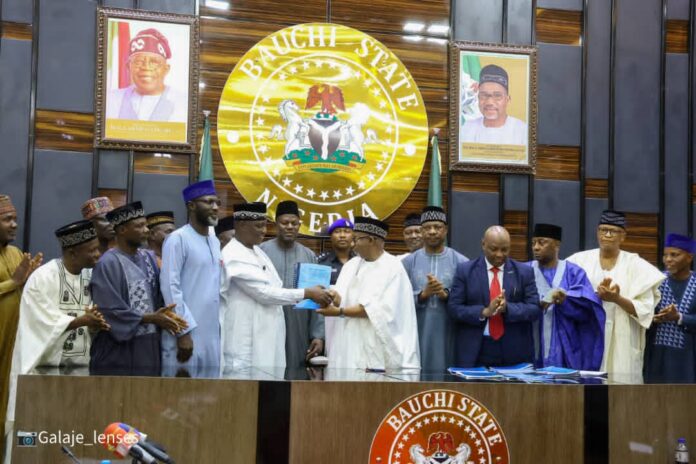By; Mohammed Kawu, Bauchi
Governor Bala Mohammed has warned strongly that his administration will not tolerate any attempt to undermine, obstruct, or politicize the implementation of its laws, especially the Chieftaincy (Appointment and Deposition) Law & Other Matter Related Thereto, 2025.
He explained that any person or group found inciting division, spreading misinformation, or attempting to disrupt public peace will face the full consequences of the law, the law enforcement agencies are fully empowered to act decisively in maintaining peace and order.
Governor Bala sounded the warning Tuesday while assenting to the
Bauchi State Emirates and Chieftaincy (Appointment and Deposition) Law and Other Matters Related Therewith, 2025 earlier passed by the State House of Assembly.
Senator Bala Mohammed further stated, “Any government official or traditional leader who acts contrary to the spirit of this reform, or engages in conduct capable of undermining its objectives, will face appropriate disciplinary action”.
Describing leadership as a trust from Almighty Allah for which all leaders will account on how they use power, the Governor said that the reforms in the state traditional institution are meant to strengthen unity, deepen local governance, and encourage cooperation.
He directed the State Attorney General and Commissioner for Justice, in collaboration with the Secretary to the State Government, to immediately gazette, publish, and distribute copies of the law to all relevant authorities and institutions for implementation.
The Governor remarked, “This is a solemn and defining moment. It is not merely about creating new Emirates and Chiefdoms, but about reaffirming our collective faith in inclusion, justice, and unity and positioning Bauchi for the next phase of its development”.
“Next year, Bauchi will mark 50 years as a state. Before 1976, we were part of the old North-East State, which has since evolved into six independent states each charting its own course of progress. That evolution itself reminds us that growth requires reform, and progress demands adaptation”
According to him, the state traditional institutions which serves as the bedrock of peace, order, and identity, must also evolve to meet the realities of growing population and changing society, saying the state population has multiplied, towns expanded, and the demands of governance becoming more complex.
Mohammed therefore stressed the need to update the structure of traditional governance to reflect realities, not to replace tradition, but to renew it and make it relevant to modern trends, recalling that the demand for expansion of the institutions started during his electioneering campaigns.
He further explained that it was in
response, and keeping with his administration’s commitment to fairness and due process that a High-Powered Committee was set up on 17th of July, 2025, composed of respected citizens from all 20 Local Government Areas, alongside senior traditional councillors
“The committee’s mandate was to review all requests, evaluate their merits, and make recommendations guided by justice, historical facts, and community consensus. Their benefits will become even clearer in the form of peace, inclusion, and accelerated development across the state”.
Emphasizing that the ongoing
reform is not an end, but a beginning of a process that will continue as the state communities grow and evolve, the Governor called on citizens to embrace unity, support the new institutions and work hand in hand with their leaders to promote peace, development, and prosperity.
Mohammed gave the fourteen new emirates and chiefdom as Bura with its headquarters in Bura, Dambam in Dambam, Darazo in Darazo, Duguri in Yuli, Gamawa in Gamawa, Giade in Giade, Toro in Toro, Warji in Katangar Warji, Ari at Gadan Maiwa, Jama’a at Nabordo, Lame at Gumau, Bununu in Bununu, Lere in Lere and Zaar at Mhrim. The existing six em
[22/10, 22:09] MUHAMMED KAWU: Mohammed gave the fourteen new emirates and chiefdom as Bura with its headquarters in Bura, Dambam in Dambam, Darazo in Darazo, Duguri in Yuli, Gamawa in Gamawa, Giade in Giade, Toro in Toro, Warji in Katangar Warji, Ari at Gadan Maiwa, Jama’a at Nabordo, Lame at Gumau, Bununu in Bununu, Lere in Lere and Zaar at Mhrim. The existing six emirates are Bauchi, Katagum, Misau, Jama’are, Ningi and Dass.
He appreciated members of the State House of Assembly for their patriotism and partnership, members of the State ExecutiveCouncil, the Chairman of Local Government Service Commission,
Hamza Koshe Committee for their exemplary diligence and integrity, as well as stakeholders, and community leaders for their support, advice, and prayers throughout this process.
The Governor spelt the objective of the reform as to make it a tool for
improving grassroots governance and attracting development to local communities, empower communities with strongervoices in decision-making, as well as address perceived injustices and fostering unity among diverse groups
It is also to recognize cultural heritage andpromoting inclusivity, and blend traditional leadership with modern governance so as to make the institution a relevant partner in development, peace, and progress, and to
increase revenue generation at the local level for developmental projects in local communities.
“To enhance and improve our data collection and indices, which are critical in determining the amount that is allocated to states and local governments in the allocation of resources and intervention by Donors and International Organizations”, the governor added. This reform is not an act of politics, but of policy; not a reward for loyalty, but a recognition of merit and necessity”.
Governor Bala described the reform process as one of the most consultative and transparent ever undertaken in Bauchi state, with the Hamza Koshe Committee, architect of the reform composed of distinguished citizens and supported by experts, received hundreds of memoranda from communities across the 20 LGAs.
”The committee conducted public hearings, invited presentations, and even visited other states to study their experiences. It developed clear criteria for assessing each request taking into account history, population, social cohesion, and economic viability. The recommendations were thorough, fair, and evidence-based, and reflected not just the wishes of the people, but also the wisdom of experience and the lessons of history”.




